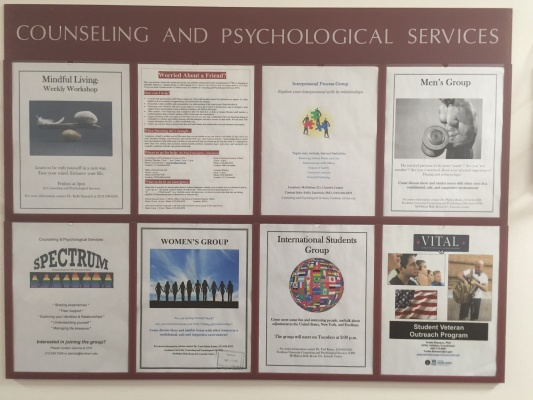FCLC’s School Survival Guide: Importance of Self Care
CPS offers several options to reduce stress and help students succeed (PAYTON VINCELETTE/THE OBSERVER)
October 27, 2015
With the temperature rapidly dropping and midterms season in full swing, getting sick seems inevitable. While physical ailments are easy to spot because they manifest in runny noses, fevers or achy muscles, mental health is in a comparably vulnerable state but often goes unnoticed. Putting mental health on the back burner seems easy to do because the remedies aren’t as obvious as getting more sleep or ingesting oranges for extra Vitamin C.
However, Dr. Yael Uness, assistant director of Counseling and Psychological Services (CPS), believes the issue is more complex. Physical and mental health are much more intertwined than we realize,.
“I don’t know if I would consider a significant distinction between mental and physical self care because they interact with each other. If you’re run down and you don’t sleep or eat properly or take care of yourself you’re not going to be doing well emotionally and the other way around. If people aren’t doing well emotionally, that can manifest in a physical way, so I think it’s really important to take care of yourself in general, whether it’s eating properly [or] sleeping properly,” Uness said.
[quote_center]There are many ways of trying to alleviate some of the pervading stress or better manage it, but it varies greatly depending on the individual.[/quote_center]
While that is easier said than done, especially during midterms, the ability to successfully function is greatly impaired without employing self care tactics. There are many ways of trying to alleviate some of the pervading stress or better manage it, but it varies greatly depending on the individual.
“I like to encourage students to have the mentality of ‘doing the best you can.’ I think sometimes there’s a cultural phenomenon of trying to be perfect, and if you’re staying up all night trying to get a hundred on a certain midterm – that’s not realistic. And what’s the cost to yourself or to other midterms? So do the best you can,” Uness encouraged.
In terms of tangible or physical ways to cope with stress once it has already arisen, Uness suggested getting some physical activity. Take a walk in Central Park, or just do some jumping jacks in your living room if you can’t get outside. The release of endorphins will make you happier, and fresh air is a great natural mood booster.
She also advocated to “Take a nap! Sleep actually does consolidate the things that have been learned in recent memory, so that can really help you study.”
Since many of us are staying up late studying for exams and writing papers, our immune systems are much more vulnerable. Getting in an hour and a half nap during the day will leave you feeling refreshed, help your study session sink in and boost your immune system.
Additionally, one of the easiest things to do is to build relaxation and break time into your study schedule. For every two hours of consistent studying or paper writing, give yourself a 20 minute break – scroll through social media newsfeeds, take a walk, eat some chocolate – just make sure your break is timed. You’re much more likely to give yourself the necessary break time without taking advantage of it this way.
Listen to your body and your mind. If you’re feeling run down or stressed out, take a second to breathe. Regroup on what you need to accomplish and divide it into tasks of manageable size. Take care of yourself and don’t let midterms be your downfall. There are plenty more tests and papers, but there is only one you. Be well!









